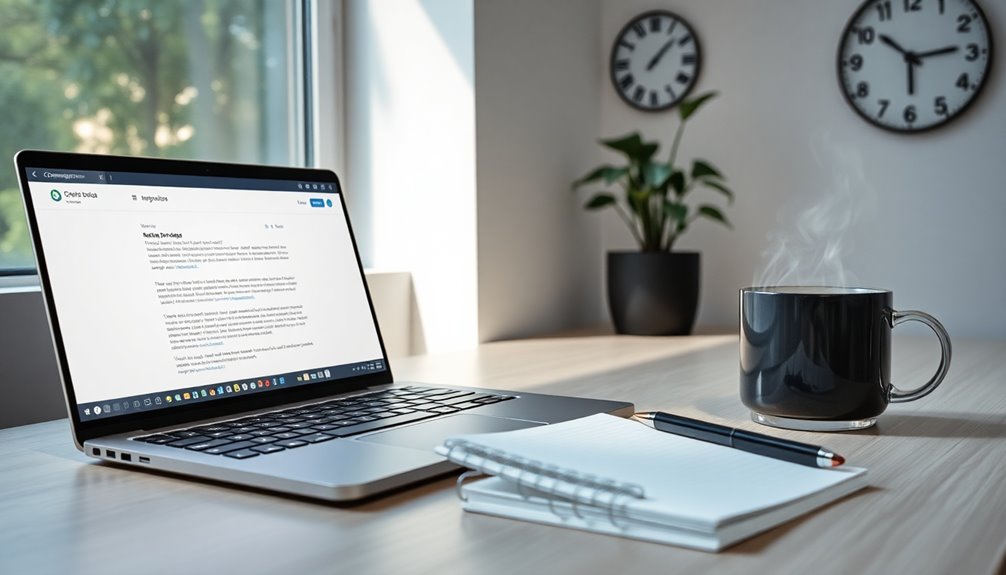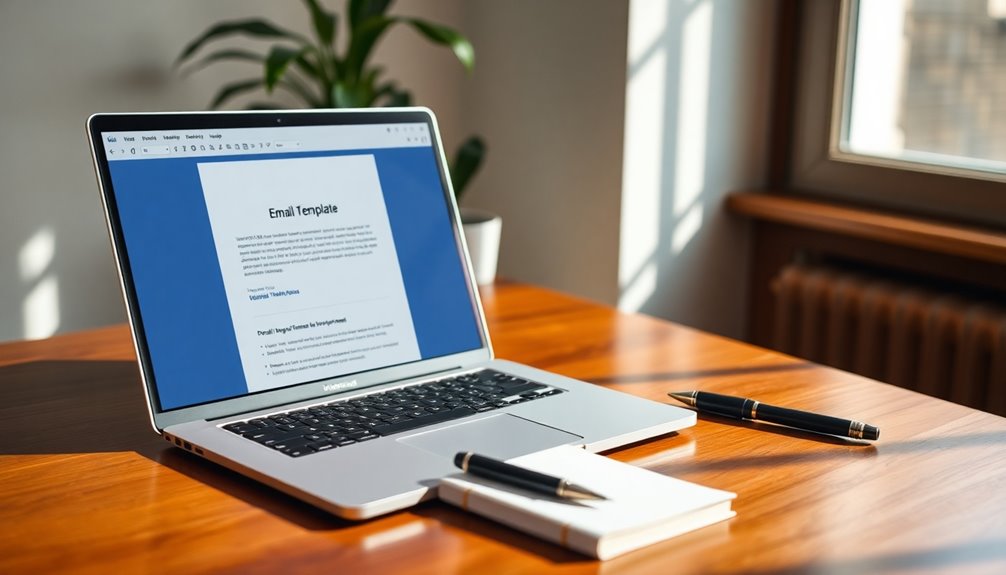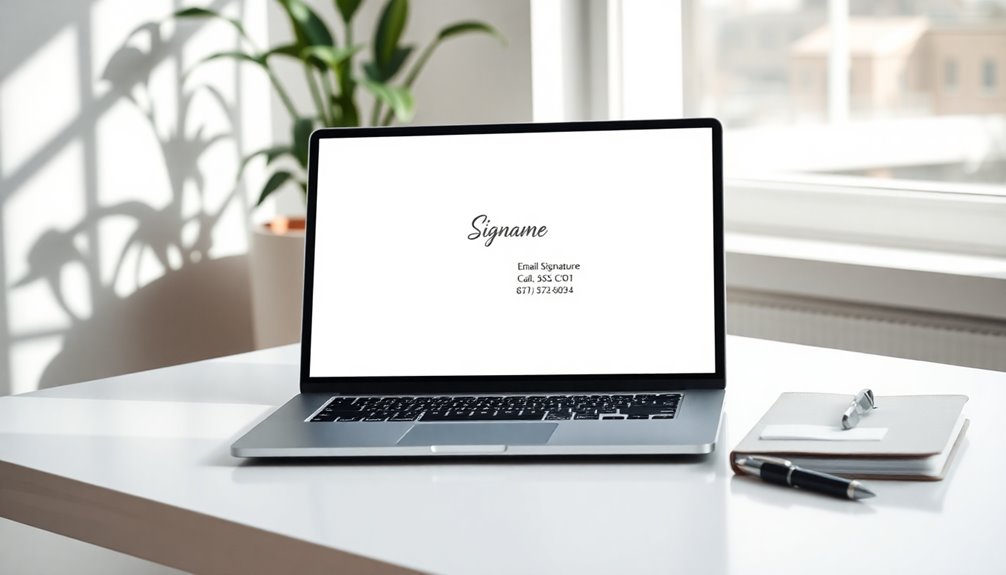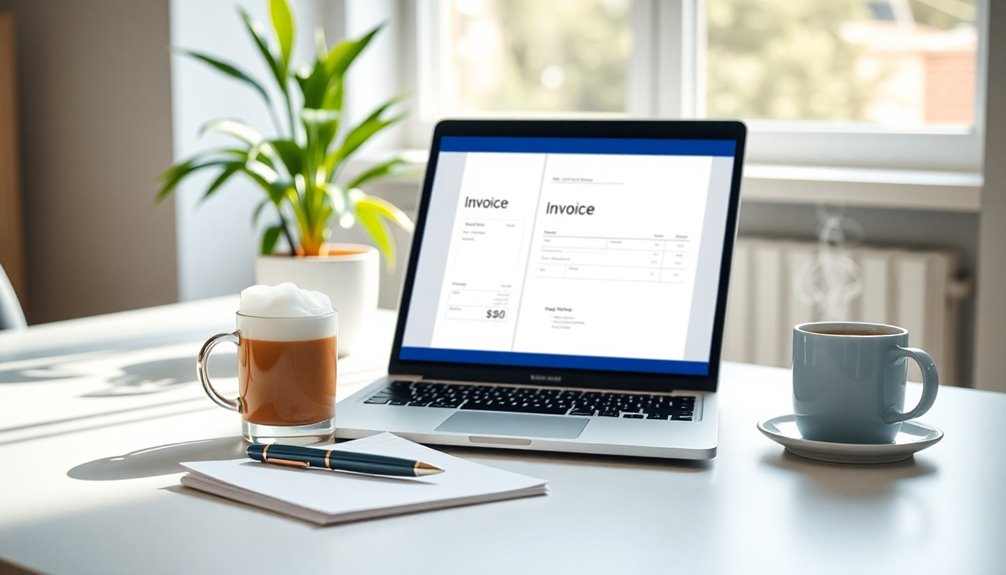To write a professional sick email, start with a clear subject line like "Sick Day: [Your Name]." Begin with a polite greeting. Briefly explain your absence without sharing too much personal detail. Make sure to include your expected return date to help your team adjust their plans. If you're reachable for urgent matters, mention that too, and suggest a colleague who can cover for you. Send your email as soon as you realize you need to take a sick day. This approach not only conveys professionalism but also supports your team's workflow. You might find more helpful tips ahead!
Key Takeaways
- Use a clear subject line like "Sick Day: [Your Name]" for immediate recognition and professionalism.
- Start the email with a polite greeting to establish respect and maintain professionalism.
- Briefly explain your absence due to illness without oversharing personal details.
- State your expected return date to help your team plan accordingly.
- Offer to assist with urgent matters if possible, and suggest a colleague for coverage.
Introduction

Writing a professional sick email is crucial for maintaining effective communication at work. A Sick Day Email serves as a formal notification to inform your employer or colleagues about your absence due to illness. It's important to communicate your situation clearly and respectfully, as this fosters trust and understanding.
Start with a clear subject line to ensure your email gets noticed promptly. In your email, provide a brief explanation of the illness so your employer understands the reason for your absence.
Timely communication is essential; ideally, send the email before the workday begins or as soon as you recognize you're unwell. Don't forget to include your expected return date to help your team plan accordingly.
Review your company policies regarding sick leave, as some employers may require a doctor's note for extended absences. By following these guidelines, you not only address your health and well-being but also show professionalism in your workplace.
A well-crafted professional email helps set the tone for your absence and promotes a respectful environment, ensuring that everyone stays informed and aligned during your time away.
Maintains Workplace Professionalism

Maintaining professionalism in your sick email sets the tone for how your absence will be perceived by your employer and colleagues.
Start with a polite greeting to establish a respectful tone. This fosters good communication and helps maintain rapport within your workplace culture.
In your sick day email, use a clear and concise subject line, such as "Sick Day Notification: [Your Name]." This immediately conveys the purpose of your email.
Briefly explain your absence without delving into excessive personal details, ensuring you respect your privacy while providing necessary information.
Clearly state your expected return date. This helps your team plan accordingly and minimizes disruptions to workflow. It shows you're considerate of their time and responsibilities.
Clear Subject Line Choice

Craft a clear subject line that instantly communicates the purpose of your email. When you're requesting sick leave, your subject line should be straightforward and to the point. Consider options like "Sick Day: [Your Name]" or "[Your Name] – Unavailable Due to Illness." These formats ensure immediate recognition by your manager and convey the message with clarity.
Using "Sick Leave Request" as your subject line sets a professional tone, making it clear that you need their attention. Including your name helps your manager quickly identify who's reaching out, especially in larger organizations where multiple emails can flood their inbox.
Keep your subject line brief yet informative, steering clear of vague terms like "Absence," which mightn't communicate the reason effectively. A well-structured subject line allows your manager to prioritize their responses and plan for coverage during your absence.
Step-by-Step Sick Email Instructions

When you need to notify your employer about your illness, follow these step-by-step instructions to ensure your email is clear and professional.
Start with a straightforward subject line, like "Sick Day: [Your Name]." This immediately informs your employer about your absence.
Next, include a polite greeting. This sets a respectful tone right from the beginning.
In the body of the email, clearly explain that you're feeling unwell and unable to work. Keep it concise and avoid excessive detail. If possible, mention how long you expect to be out.
Also, let your employer know your availability for urgent matters. If you're able to check emails or take calls, include that information.
It's also a good idea to provide the name of a colleague who can cover your responsibilities during your absence, making things easier for your team.
Dos and Don'ts for Sick Emails

Writing a sick email requires a balanced approach to ensure professionalism while communicating your absence. First, do inform your manager as soon as you realize you need a sick day. This allows them to plan for coverage effectively.
Clearly state the reason for your absence, but remember, don't overshare personal details. Maintaining a polite and professional tone throughout your email is essential, so address your manager respectfully.
It's important to provide an estimated return date to help your team adjust their expectations. If you have any urgent tasks pending, do offer to assist by suggesting a colleague's contact for coverage. This shows responsibility and a commitment to teamwork.
On the other hand, don't wait until the start of your workday to send your email, as this may disrupt workflow. Avoid using an informal tone; your communication should reflect your professionalism.
Examples of Absence Notifications

Finally, close your email with gratitude to maintain professionalism and foster goodwill.
A simple "Thank you for your understanding" can go a long way in preserving positive relationships with colleagues and management.
Pro Tips for Writing Effective Emails

Crafting effective emails requires attention to detail and a focus on clarity. Start with a clear subject line, like "Sick Leave Notification: [Your Name]." This sets the tone right away.
Maintain a professional tone throughout your email; use polite language and avoid casual expressions to show respect for your employer and colleagues.
Briefly explain your situation. State the nature of your illness without oversharing and include your expected return date if you can. If you're able to address urgent matters during your sick day, let them know your availability.
It's also helpful to suggest a colleague who can cover your responsibilities while you're away.
Before hitting send, don't forget to proofread your email. Check for clarity, grammar, and professionalism, as this is key for effective communication. A polished email reflects your commitment to your work and helps maintain your professional image, even in times of illness.
Final Thoughts

Understanding how to communicate effectively during a sick day can make a significant difference in how your absence is perceived. By maintaining a professional tone in your email, you reinforce trust and respect within your workplace.
A well-crafted email should include a brief explanation of your illness while avoiding excessive personal details. This approach keeps your communication transparent yet professional.
When you notify your supervisor promptly, you show consideration for your team's workload. Your absence would impact workplace planning, so stating your expected return date helps them prepare for your temporary absence.
It's crucial to follow company policies regarding sick leave notifications, which may include providing a doctor's note for extended absences. This ensures compliance and support from HR.
Frequently Asked Questions
How Do You Say You Are Sick in a Professional Email?
When you need to inform your employer that you're sick, start with a clear subject line like "Sick Day Notification: [Your Name]."
In the email, briefly explain that you're unwell, mentioning the illness without going into detail.
State when you expect to return, and clarify your availability for urgent matters, if any.
Always use a polite tone and thank your manager for their understanding to maintain professionalism throughout your message.
How Do You Leave an Email for Being Sick?
When you need to leave an email for being sick, start with a clear subject line, like "Sick Day: [Your Name]."
Address your manager and relevant team members politely. Briefly explain you're unwell without going into too much detail, and mention how long you expect to be absent.
If you're able, offer your availability for urgent matters.
How to Write a Sick Message for Work?
When you need to write a sick message for work, start with a clear subject line like "Sick Leave Notification."
Briefly explain your illness without going into too much detail, and if you know your return date, include that.
Keep the tone professional and polite, thanking your team for their understanding.
If possible, mention someone who can cover your responsibilities or offer assistance with urgent tasks.
Send it as soon as you can.
How Do You Write a Long Sick Leave Email?
To write a long sick leave email, start with a clear subject line indicating your request.
Briefly explain your illness, keeping details professional.
State how long you expect to be absent and mention any doctor's recommendations.
Let your team know who's covering your responsibilities during your time away.
Conclude by thanking your employer for their understanding, and offer to provide updates as needed.
This keeps communication open and shows your professionalism.









